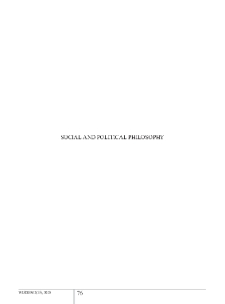Object
Title: Anthropology of Smells: History and Modernity
Journal or Publication Title:
Date of publication:
Volume:
Number:
ISSN:
Corporate Creators:
Խ․ Աբովյանի անվան հայկական պետական մանկավարժական համալսարան
Coverage:
Abstract:
The smell is one of the most significant factors influencing human consciousness and behaviour. This is due not only to the biological aspects of its origin and the actualization of the bodily being of a human but also to deeply rooted in culture and society stereotypes and patterns of perception that determine the value system, cognitive attitudes and social structure of each particular culture. This is the essence of the relevance of the project of historization and anthropologization of smell, based on the original model of describing the transformation of human cultural practices, which equally takes into account the natural and social aspects of human life and can identify the regulatory mechanisms, order and principles of sociocultural changes. Although a modern man does not fully realize the power of olfactory area of his sense empire, this does not free him from the power of reflex reactions, cultural norms and social demarcations, originating in the olfactory receptivity. Perhaps, that is why the rationalistic ideal of deodorization has not been achieved by modern perfumers, who only mask, but not destroy smells, that are, in some sense, completely indestructible, because they can effectively shape a person‟s cultural identity, historical memory and even self-awareness.
Place of publishing:
Երևան
Publisher:
Format:
Identifier:
oai:arar.sci.am:370657
Language:
Object collections:
Last modified:
Oct 8, 2025
In our library since:
Feb 28, 2024
Number of object content hits:
50
All available object's versions:
https://arar.sci.am/publication/400495
Show description in RDF format:
Show description in OAI-PMH format:
-
Իմաստություն=Wisdom=Мудрость
-
Իմաստություն, 2013, N 1
-
Իմաստություն, 2014, N 1 (2)
-
Իմաստություն, 2014, N 2 (3)
-
Իմաստություն, 2015, N 1 (4)
-
Wisdom, 2015, N 2 (5)
-
Wisdom, 2016, N 1 (6)
-
Wisdom, 2016, N 2 (7)
-
Wisdom, 2017, N 1 (8)
-
Wisdom, 2017, N 2 (9)
-
Wisdom, 2018, N 1 (10)
-
Wisdom, 2018, N 2 (11)
-
Wisdom, 2019, N 1 (12)
-
Wisdom, 2019, N 2 (13)
-
Wisdom, 2020, N 1 (14)
-
Wisdom, 2020, N 2 (15)
- Editorial board
- Content
- Editor`s Foreword
- Patience: an Introduction to the Concept
- Projections of Intermediality in a Literary Text
- Postmodern Interpretation of the Metaphysical Grounds of the Wealth Phenomenon
- Memes as the Phenomenon of Modern Digital Culture
- Text-Transforms – Communicative Paradigm Basis Of A Literary Work
- Smart Technologies: Unique Opportunities Or The Global Challenges Of Transhumanism
- Anthropology of Smells: History and Modernity
- The Place of a Person in the Ontological Principles of Global Constitutionalism: Social and philosophical analysis
- The Ideology of Socialism and the Armenian Political Parties
- Modern Dangers in the Development of the Russian Education System and Ways to Overcome Them: Socio-Philosophical Analysis
- Wisdom Lessons Based on the “Cytokine-Storm” Metaphor
- The Doctrine of “Joint Criminal Enterprise”: Criminal Liability of the Military-Political Leadership of the Armed Conflict Opposing Party for Committing War Crimes
- Features of Human Dignity in the Context of Modern Philosophy of Law
- International Legal and Philosophical Aspects of the New Protection Concept of the Common Heritage of Mankind
- Thinking beyond, living beyond: Futurism
- Philosophy of Red Color: Linguistic and Extralinguistic Aspects
- Giacomo Puccini's Operatic Legacy and Its Study in the Practice of Vocalists
- The German View on Modernism and Postmodernism
- Notes to Contributors
- Authors
-
Wisdom, 2020, N 3 (16)
-
Wisdom, 2021, N 1 (17)
-
Wisdom, 2021, N 1 (1) Special issue
-
Wisdom, 2021, N 2 (18)
-
Wisdom, 2021, N 3 (19)
-
Wisdom, 2021, N 4 (20)
-
Wisdom, 2022, N 1 (21)
-
Wisdom, 2022, N 1 (2) Special issue
-
Wisdom, 2022, N 2 (22)
-
Wisdom, 2022, N 2 (3) Special issue
-
Wisdom, 2022, N 3 (23)
-
Wisdom, 2022, N 3 (4) Special issue
-
Wisdom, 2022, N 4 (24)
-
Wisdom, 2023, N 1 (25)
-
Wisdom, 2023, N 2 (26)
-
Wisdom, 2023, N 3 (27)
-
Wisdom, 2023, N 4 (28)
-
Wisdom, 2024, N 1 (29)
-
Wisdom, 2024, N 2 (30)
-
Իմաստություն, 2013, N 1
| Edition name | Date |
|---|---|
| Avakyan, Laura, Anthropology of Smells: History and Modernity | Oct 8, 2025 |





